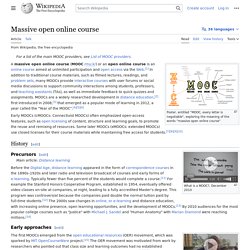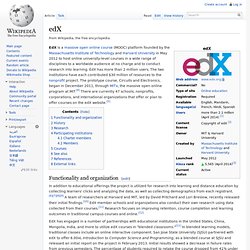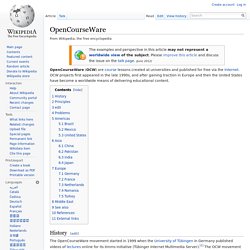

Massive open online course. Poster, entitled "MOOC, every letter is negotiable", exploring the meaning of the words "Massive Open Online Course" A massive open online course (MOOC /muːk/) is an online course aimed at unlimited participation and open access via the web.[1] In addition to traditional course materials such as filmed lectures, readings, and problem sets, many MOOCs provide interactive user forums to support community interactions among students, professors, and teaching assistants (TAs).

MOOCs are a recent and widely researched development in distance education which were first introduced in 2006 and emerged as a popular mode of learning in 2012.[2][3] Early MOOCs often emphasized open-access features, such as open licensing of content, structure and learning goals, to promote the reuse and remixing of resources. Some later MOOCs use closed licenses for their course materials while maintaining free access for students.[4][5][6][7] History[edit] What is a MOOC? Precursors[edit] Early approaches[edit] Coursera. Daphne Koller: What we're learning from online education. Khan Academy. The website features thousands of educational resources, including a personalized learning dashboard, over 100,000 exercise problems, and over 5,000 micro lectures[5] via video tutorials stored on YouTube teaching mathematics, history, healthcare, medicine, finance, physics, general chemistry, biology, astronomy, economics, cosmology, organic chemistry, American civics, art history, macroeconomics, microeconomics, and computer science.[6] All resources are available for free to anyone around the world.
Khan Academy reaches about 10,000,000 students per month and has delivered over 300,000,000 lessons.[7][8] History[edit] In late 2004, Khan began tutoring his cousin Nadia in mathematics using Yahoo! 's Doodle notepad. Khan Academy has eclipsed MIT's OpenCourseWare (OCW) in terms of videos viewed. Khan Academy also has thousands of resources translated into other languages. Khan Academy also launched a computer science module in September 2012.[21][22] Technical format[edit] Badges[edit]
EdX. EdX is a massive open online course (MOOC) platform founded by the Massachusetts Institute of Technology and Harvard University in May 2012 to host online university-level courses in a wide range of disciplines to a worldwide audience at no charge and to conduct research into learning.

EdX has more than 2 million users. The two institutions have each contributed $30 million of resources to the nonprofit project. The prototype course, Circuits and Electronics, began in December 2011, through MITx, the massive open online program at MIT.[4] There are currently 47 schools, nonprofits, corporations, and international organizations that offer or plan to offer courses on the edX website.[5] Functionality and organization[edit] EdX has engaged in a number of partnerships with educational institutions in the United States, China, Mongolia, India, and more to utilize edX courses in "blended classrooms The edX platform uses online learning software that uses interactive experiences.
OpenCourseWare. History[edit] The OpenCourseWare movement started in 1999 when the University of Tübingen in Germany published videos of lectures online for its timms initiative (Tübinger Internet Multimedia Server).[1] The OCW movement only took off, however, with the launch of MIT OpenCourseWare at the Massachusetts Institute of Technology (MIT) and the Open Learning Initiative at Carnegie Mellon University[2] in October 2002.

The movement was soon reinforced by the launch of similar projects at Yale, the University of Michigan, and the University of California Berkeley. MIT's reasoning behind OCW was to "enhance human learning worldwide by the availability of a web of knowledge".[3] MIT also stated that it would allow students (including, but not limited to its own) to become better prepared for classes so that they may be more engaged during a class. Since then, a number of universities have created OCW, some of which have been funded by the William and Flora Hewlett Foundation.[3] Principles[edit]